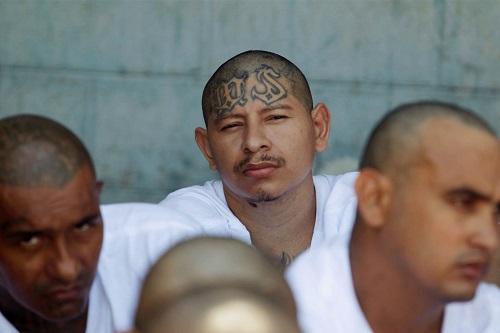Reuters photo
By
Ricardo Swire
Internal security patterns dictate when criminal gangs implode or fragment the host country’s levels of violence, crime and murder peak. The Caribbean intelligence apparatus continuously monitors transnational organized crime syndicates such as El Salvador’s MS-13 that has permeated Central America and neighbouring Dutch Caribbean territories Aruba, Curacao and Bonaire. A wave of violence started in 2000 and mostly affects northern Central America including Belize, El Salvador, Guatemala and Honduras. “Marabuntas” or “maras” are considered Central America’s most serious challenge to peace and internal security.
The deadly ant species, embodied in the word mara, is replicated by MS-13 one of El Salvador’s most vicious gangs. Dutch Caribbean island Aruba’s internal security reports have documented one particular violent Weststraat and Royal Plaza mara clash. In the national security breach a responding Oranjestad police car was hijacked, its burnt out shell discovered in another district called Sta. Cruz. Additional law enforcement support dispatched from San Nicholas, confronted approximately one hundred gang members who had started fighting near Royal Plaza. After officers fired one warning shot in the air as a deterrent gang members taunted they too have guns and are not afraid. Two entertainment venues, “Carlos n Charles” and “Bahia,” caught in the middle of the mêlée, were forced to close.
In several Central American countries internal security reports indicate crime is the paramount public policy issue that decides political elections. Crime also changes the relationship between residents and governments. Caribbean intelligence officials note the recent past when ultraviolent youth gangs, spawned in Los Angeles and other US cities, migrated south to Central America. These gang-bangers are now powerful cross-border criminal networks. Caribbean governments and immigration officials should be cognizant of MS-13’s illegal people-movement tactics, similar to the unaccompanied children and teenagers who flood the Rio Grande Valley in Texas as decoys.
Caribbean defense, police, immigration and border control agencies hopefully have active plans to confront ongoing regional MS-13 expansion. An exercise successfully promoted via technological infiltration that induces psychological manipulation of local prison populations. MS-13 also has intimate relationships with Mexican cartels. In the current dispensation trends show that Caribbean islands’ gang membership is almost synonymous to jail residency.
In MS-13’s home base El Salvador the mara’s power and national control has caused competitive internal fractures. El Salvador’s revised domestic Security Ministry data frequently mentions a rebel splinter called “MS503” or the “503 Program.” “Shyboy” is the new twenty-one member breakaway gang’s Public Relations Officer. His face circulates online in two videos, reading the 503 Program’s messages from a notebook. One year ago this month Shyboy, a former MS-13 devotee, was released from Zacatecoluca prison after serving eighteen years.
Ricardo Swire
Ricardo Swire is the Principal Consultant at R-L-H Security Consultants & Business Support Services and writes on a number of important issues.



No Comments Yet!
You can be first to comment this post!